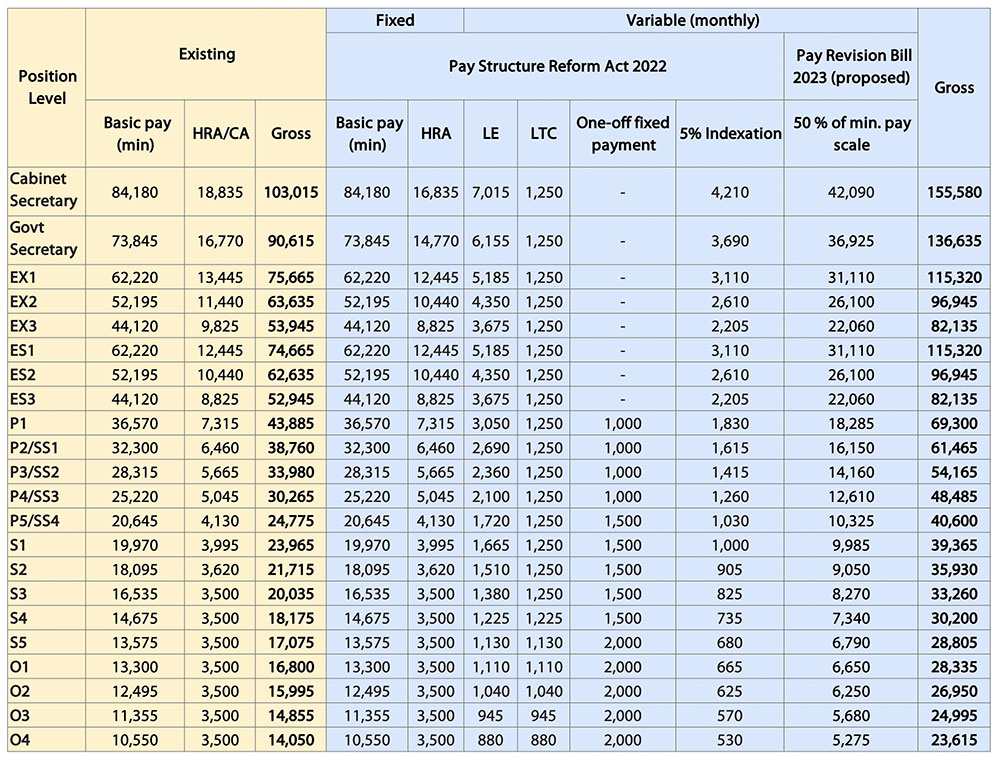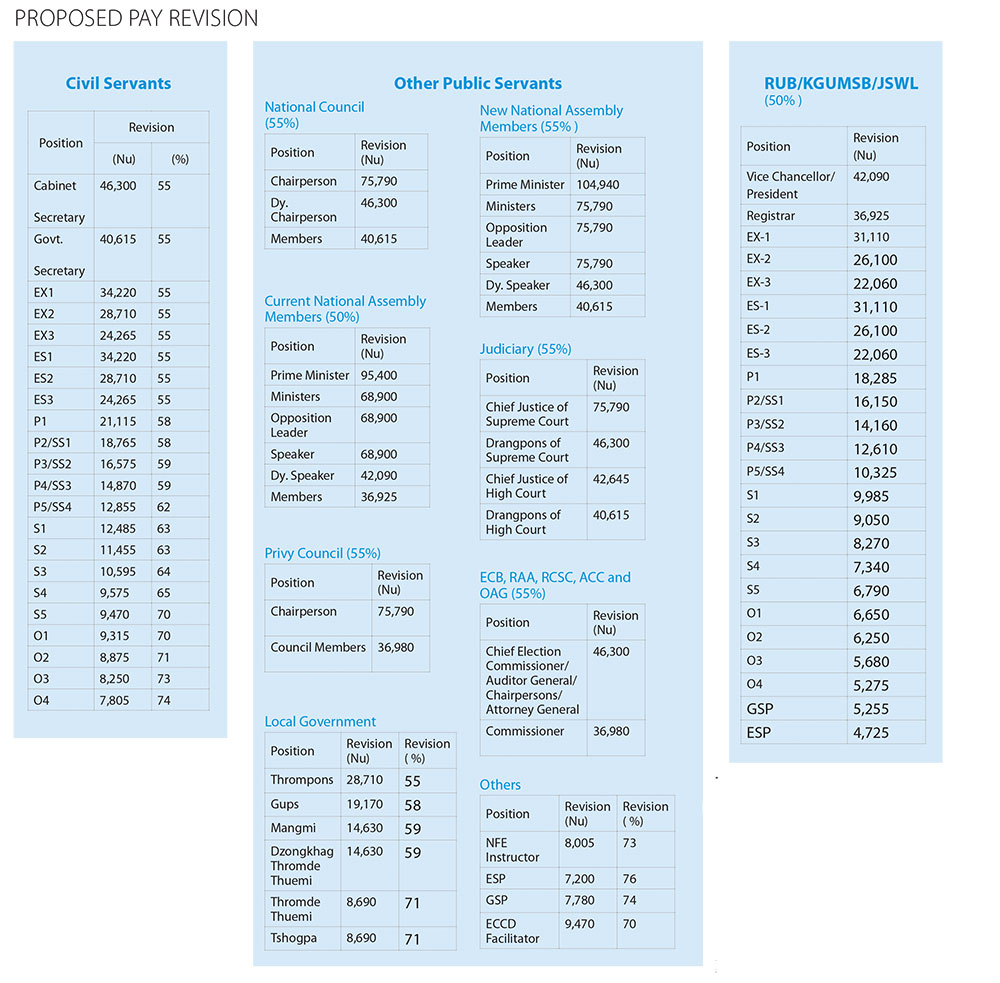Thukten Zangpo
If the parliament passes the Pay Revision Bill of Bhutan 2023, the civil servants will draw a salary hike of 55 to 74 percent on their minimum pay scale from July 1 this year.
To meet the rising cost of living, the Bill proposed a lumpsum upward revision of 50 percent on the minimum pay in all positions, continuing a one-off 5 percent indexation and one-off fixed payment of the Pay Structure Reform Act of Bhutan 2022.
The revision will also prorate per month the leave encashment of one month’s minimum pay scale and leave travel concession of one month’s minimum pay with a maximum ceiling of Nu 15,000.

Introducing the Bill yesterday, the Member In-Charge of the Bill, Finance Minister Namgay Tshering said that the revision was based on ensuring public servants are fairly remunerated and the revision will promote competency, meritocracy, and dynamism and at the same time endeavour to motivate and retain talents in the public service.
He also added that the revision is based on the Bhutan Living Standard Survey, which states that the minimum expenditure of Nu 19,374 per month in urban areas.
Salary for civil servants in EX3 or ES3 level and above is proposed to revise by 55 percent—50 percent lump sum and one-off 5 percent indexation.
For P1 level and below, the proposed revision is between 58 to 74 percent (50 percent lumpsum, one-off 5 percent indexation, and one-off fixed payment between Nu 1,000 to Nu 2,000).
For example, the Cabinet Secretary’s existing minimum basic monthly pay is Nu 84,180, excluding house rent allowance (HRA) of Nu 16,835 per month. With 50 percent proposed pay revision and one-off 5 percent salary indexation, he or she is entitled to 55 percent pay hike amounting to Nu 130,480 per month.
Similarly, a driver (O4) draws a minimum monthly basic pay of Nu 10,550, excluding the HRA of Nu 3,500 per month. With the proposed pay revision of 74 percent, a driver will get Nu 18,355 per month (50 percent plus one-off 5 percent and an additional Nu 2,000 lumpsum one-off fixed payment).

For the current National Assembly members, the Bill proposed 50 percent revision, excluding 5 percent indexation. This means Lyonchhen will draw an additional Nu 95,400 per month amounting to Nu 305, 275.
The current ministers and equivalent positions will receive additional Nu 68,900 totaling Nu 220,475 per month. Similarly, the MPs will get Nu 110,770 per month.
However, the new members of the National Assembly, current National Council members, constitutional postholders equivalent to the minister’s position, thrompons will get 55 percent raise.
For the new prime minister, the monthly salary comes to Nu 295,740 with a 55 percent pay hike. The new ministers and equivalent positions like chairperson of National Council, new National Assembly speaker, opposition leader and the constitutional postholders will get additional Nu 75,790 and a monthly salary of Nu 213,590. While the MPs will draw a salary of Nu 114,460 a month.
At the same time, the thrompons and gups will receive an additional salary of Nu 28,710 and Nu 19,170 respectively. Tshogpa will receive additional Nu 8,690.
To help health sector professionals, the Bill recommended additional revisions for professional allowances ranging from 55 percent to 80 percent.
The professional allowance for general doctors with MBBS or dentists with BDS but less than masters’ degree shall be revised to a lumpsum of 55 percent of the minimum pay scale.
For the medical and dental specialist to be revised to a lump sum of 70 percent of the minimum pay scale from existing 55 percent. For medical and dental sub-specialist to revise to a lumpsum of 80 percent of the minimum pay scale from 60 percent.
However, the drungtshos will draw the same level of professional allowance of 45 percent, 55 percent and 60 percent.
Although the Sixth Pay Commission report recommended professional allowance for teachers of 35 percent, 45 percent and 55 percent which is based on the number of years of teaching to be shifted to competency-based incentive, the Pay Bill did not include this provision.
The Bill has also proposed a special contract allowance for highly specialised professionals or executives or professionals or experts recruited from outside the public service determined in consultation with the finance ministry and upon approval of the government.
As a move towards a clean wage system this time, the Bill also included Royal University of Bhutan, Khesar Gyalpo University of Medical Sciences of Bhutan, and Jigme Singye Wangchuck School of Law with an upward revision of 50 percent.
The revision for the employees of Election Commission of Bhutan, the judicial services, Royal Academy of Performing Arts and para-regular services is at par with the equivalent positions mapped in the civil service.
The Bill was referred to the Economic and Finance Committee for further review. The Committee will table its findings and recommendations on June 21 for third reading.
Post-service benefits
Given the sustainability issues, the existing post-service benefits scheme will be continued until revised and notified by the government in line with the ongoing National Pension and Provident Fund reform.
Financial implications
The financial implications of the proposed revision are estimated at Nu 6 billion annually. With the estimated domestic revenue of Nu 42.25 billion and current expenditure of Nu 39.55 billion, there is an operating surplus of Nu 2.7 billion in fiscal year 2023-24.
However, with an additional Nu 6 billion incurring with the pay revision, to meet the deficit of Nu 3.3B, Druk Holding and Investments Limited will provide one-off top-up of Nu 4 billion for each fiscal year 2023-24 and 2024-25. This top-up will be over and above the dividend to be provided and transferred to the finance ministry.


